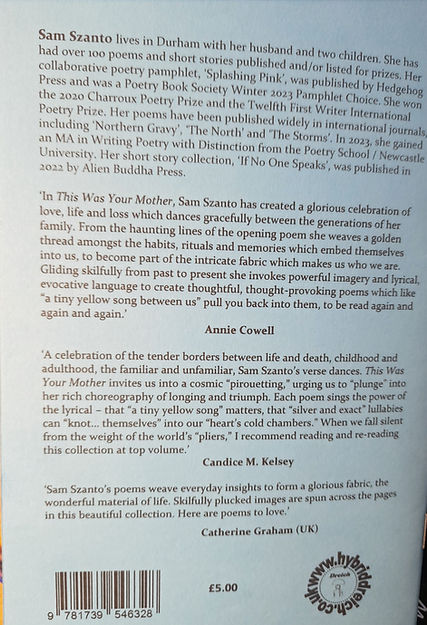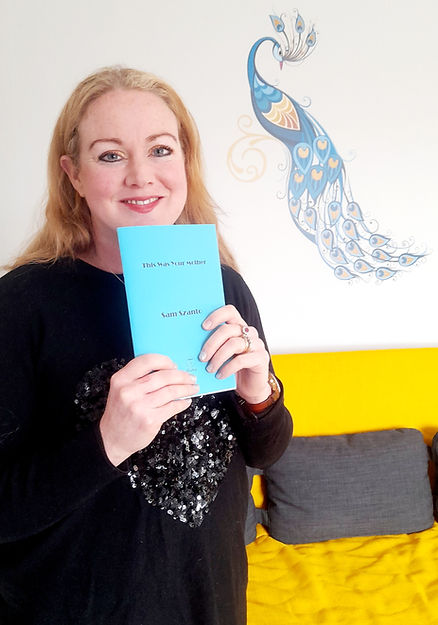20 Questions with... Audrey T. Carroll
- samszanto2
- May 21, 2023
- 4 min read

Audrey T. Carroll is the author of the What Blooms in the Dark (ELJ Editions, 2024) and Parts of Speech: A Disabled Dictionary (Alien Buddha Press, 2023). Her work has been nominated for the Pushcart Prize and for Best of the Net. Her writing has appeared in Lost Balloon, CRAFT, JMWW, Bending Genres, Hawaii Pacific Review, and others. She is a bi/queer and disabled/chronically ill writer who serves as a Diversity & Inclusion Editor for the Journal of Creative Writing Studies. She can be found at http://AudreyTCarrollWrites.weebly.com and @AudreyTCarroll on Twitter and Instagram.
1. Please introduce yourself. Where are you from? What was your life like growing up?
I’m from Queens, NYC. Jane Goodall was my hero. Charlotte’s Web by E.B. White is the first book that I remember falling in love with. I met Angela, my best friend of 20+ years, when we played on the same softball team together.
2. Did you always want to be a writer? If you also work, what do you do / did you do?
I’ve always wanted to be a writer. (When I was nine-years-old, I did want to be a writer/artist/ballerina.) I am also a college instructor, with experience teaching creative writing, literature, and composition.
3. Tell us about your most recently published work in a sentence.
Parts of Speech: A Disabled Dictionary is a hybrid creative nonfiction chapbook that uses the dictionary form to examine the way language determines and is determined by disabled/chronically ill experiences.
4. What are you working on right now?
I’m working on multiple projects, including a memoir-in-essays that uses primarily hybrid/experimental forms to explore disability and chronic illness.
5. Do you have a writing routine, and if so what is it?
I like routine. I’ll usually come up with a bunch of ideas (for example, ideas for essays or short stories). Then I’ll pick one and write notes for it, potentially as an outline. I wait at least two weeks to write a first draft. I wait 2-4 weeks to revise. Then I wait a week until I edit, and then one more edit a week later. Usually, in edits, I read aloud at least once to check the language. Unless there’s some kind of wrench in the works, which happens sometimes, it usually takes me about 6-10 weeks to feel like an essay or story is finished.
6. Where do you write – always in the same space, or different places? Can you write ‘on the move’?
I typically write in my living room, but I always have at least one notebook on me. I may have a line come to me in the middle of the night and type it into my phone; I may write at my desk in my office; I may jot down an idea in the classroom.
7. What advice do you have for other authors who are starting out? What is the best advice you’ve heard?
Persistence is the name of the game. I think that’s the most important quality that any writer could have.
8. Do you enjoy doing live readings or are they a necessary evil – or somewhere in between?
I love doing live readings. I think they’re a lot of fun, both from the performance side of things and from the audience side of things.
9. Are there recurring themes in your work? Where do you feel these emanate from if so?
Found family, because I’ve had this in my own life.
Motherhood, which has been something that I’ve thought a lot about even before I was a mother because it’s a fascinating positionality/relationship.
Magic/wonder, because I think that we lose a lot of that sense of magic in the world as we get older and I like trying to capture it again.
10. Should writers have a moral purpose? What is the purpose of a writer in today’s society?
I think writers have to make that call for themselves. I would say that I feel particular ethical obligations, especially in how I represent disability, chronic illness, queerness, and bisexuality. These are identities that are so often unrepresented, or underrepresented, or misrepresented, and so I want to take the inclusion of these ways of being seriously, in addition to joyously.
11. Do you write between genres or not?
I do! I write fiction (especially magical realism/fabulism, but also literary, fantasy, and Sapphic romance, to name a few), creative nonfiction, poetry, and hybrid work like lyric essays/hermit crab essays/prose poetry.
12. Which living writers do you most admire?
Marisa Crane, Jessica Johns, Erick Setiawan, Casey McQuiston, Carmen Maria Machado, Julie Otsuka, Lesley Nneka Arimah, Jericho Brown, Ada Limón, Natalie Wee, Madeline Miller, T. Kingfisher, Kim Fu, Esmé Weijun Wang
13. Which dead writers do you most admire?
James Baldwin, bell hooks
14. What’s the book you wish you’d written?
I Keep My Exoskeletons to Myself by Marisa Crane
15. What other external influences do you have: nature/place, music etc?
Nature, Vitamin String Quartet, and coffee.
16. Do you suffer from ‘writer’s block’ and how do you overcome it if so?
I prefer to think of it with different metaphors. One metaphor is a well: if my well is empty, I have to refill it by reading books I enjoy, watching TV, researching nature, etc.
Another metaphor I like is one of seasons—sometimes, you’re plotting and planting seeds, sometimes you’re writing, sometimes you’re revising/editing, and sometimes you rest and restore yourself.
17. What’s been your favourite reaction to your writing?
Honestly, I’ve been lucky enough to have lots of lovely responses. I’ll go with the folks who were kind enough to write blurbs for Parts of Speech: A Disabled Dictionary: Joshua Gage, Christine Brooks, and Harry McNabb.
18. How do your family and friends feel about your writing?
They’ve been very supportive. I’ve especially appreciated the support of my husband, TJ, and my friends Angela and Maggie. (And my daughter, who is five and only kind of understands what I do, but she gets points for enthusiasm.)
19. Do you have a favourite bookshop?
I like Wakefield Books in Rhode Island a lot. I’d also love to get to Kew & Willow in Queens, NYC one day.
20. How do you see the future of writing? Will we become more or less dependent on Amazon?
I honestly have no idea, but I hope that the community of writers/readers continues to get stronger.










Comments